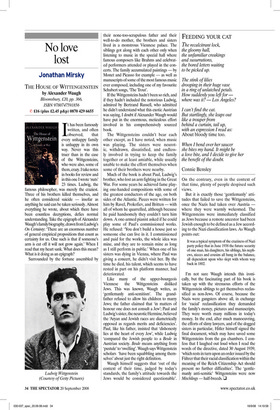No love lost
Jonathan Mirsky
THE HOUSE OF WITTENGENSTEIN by Alexander Waugh Bloomsbury, £20, pp. 366, ISBN 9780747591856 ✆ £16 (plus £2.45 p&p) 0870 429 6655 It has been famously written, and often observed, that every unhappy family is unhappy in its own way. Never was this truer than in the case of the Wittgensteins, who were also, some of them, crazy. I take notes in books for review and in this one I wrote ‘nuts’ 23 times. Ludwig, the famous philosopher, was merely the craziest. Three of his brothers killed themselves, and he often considered suicide — insofar as anything he said can be taken seriously. Almost everything he wrote, about which there have been countless decryptions, defies normal understanding. Take the epigraph of Alexander Waugh’s family biography, drawn from Ludwig’s On Certainty: ‘There are an enormous number of general empirical propositions that count as certainty for us. One such is that if someone’s arm is cut off it will not grow again.’ When I read that my heart sank. What does this mean? What is it doing as an epigraph?
Surrounded by the fortune assembled by their none-too-scrupulous father and their well-to-do mother, the brothers and sisters lived in a monstrous Viennese palace. The siblings got along with each other only when listening to music in the special hall where famous composers like Brahms and celebrated performers attended or played in the concerts. The family accumulated paintings — by Monet and Picasso for example — as well as manuscripts of some of the most famous music ever composed, including one of my favourite Schubert songs, ‘The Trout’.
If the Wittgensteins hadn’t been so rich, and if they hadn’t included the notorious Ludwig, admired by Bertrand Russell, who admitted he didn’t understand what this exotic Austrian was saying, I doubt if Alexander Waugh would have put in the enormous, meticulous effort involved in his comprehensively sourced book.
The Wittgensteins couldn’t bear each other except, as I have noted, when music was playing. The sisters were neurotic, withdrawn, dissatisfied, and endlessly involved in trying to keep the family together or at least amiable, while usually unable to make the effort themselves when some of their brothers were nearby.
Much of the book is about Paul, Ludwig’s brother, who lost an arm fighting in the Great War. For some years he achieved fame playing one-handed compositions with some of the greatest conductors of the age, on both sides of the Atlantic. Pieces were written for him by Ravel, Prokofiev, and Britten — with all of whom he quarrelled, although because he paid handsomely they couldn’t turn him down. A one-armed pianist asked if he could play some of Paul’s commissioned works. He refused: ‘You don’t build a house just so someone else can live in it. I commissioned and paid for the works, the whole idea was mine, and they are to remain mine as long as I still perform in public.’ When one of his sisters was dying in Vienna, where Paul was giving a concert, he didn’t visit her. By the time he died, his talent, which seems to have rested in part on his platform manner, had deteriorated.
Like many of the upper-bourgeois Viennese the Wittgensteins disliked Jews. This was known, Waugh writes, as ‘gentlemanly anti-semitism’. The grandfather refused to allow his children to marry Jews; the father claimed that ‘in matters of honour one does not consult a Jew’; Paul and Ludwig’s sister, the neurotic Hermine, believed the ‘Aryan and Jewish races are diametrically opposed as regards merits and deficiencies’. Paul, like his father, insisted that ‘dishonesty lies at the heart of every Jew’, while Ludwig ‘compared the Jewish people to a Beule in Austrian society. Beule means anything from ‘pustule’ to ‘swelling’. Waugh says Wittgenstein scholars ‘have been squabbling among themselves’ about just the right definition.
Waugh himself suggests that ‘out of the context of their time, judged by today’s standards, the family’s attitude towards the Jews would be considered questionable’. On the contrary, even in the context of that time, plenty of people despised such views.
But it is exactly those ‘gentlemanly’ attitudes that failed to save the Wittgensteins, once the Nazis had taken over Austria — where they were warmly welcomed. The Wittgensteins were immediately classified as Jews because a remote ancestor had been Jewish enough to be defined as a Jew according to the Nazi classification laws. As Waugh points out:
It was a typical symptom of the craziness of Nazi party policy that in June 1938 the future security of one man, his daughters, his siblings, his nephews, nieces and cousins all hung in the balance, all dependent upon who slept with whom way back in 1802.
I’m not sure Waugh intends this ironically, but the fascinating part of his book is taken up with the strenuous efforts of the Wittgenstein siblings to get themselves reclassified as non-Jews. Of course, because the Nazis were gangsters above all, in exchange for ‘racial’ reclassification they demanded the family’s money, pictures and manuscripts. They were worth many millions in today’s money. In the end, after much manoeuvring, the efforts of slimy lawyers, and of the dogged sisters in particular, Hitler himself signed the final document, which may have saved some Wittgensteins from the gas chambers. I confess that I laughed out loud when I read the words of the directive, dated 30 August 1939, ‘which rests in turn upon an order issued by the Führer that their racial classification within the meaning of the Reich Citizenship Act should present no further difficulties’. The ‘gentlemanly anti-semitic’ Wittgensteins were now Mischlings — half-breeds. q










































































 Previous page
Previous page